#its also transparent!!
Photo
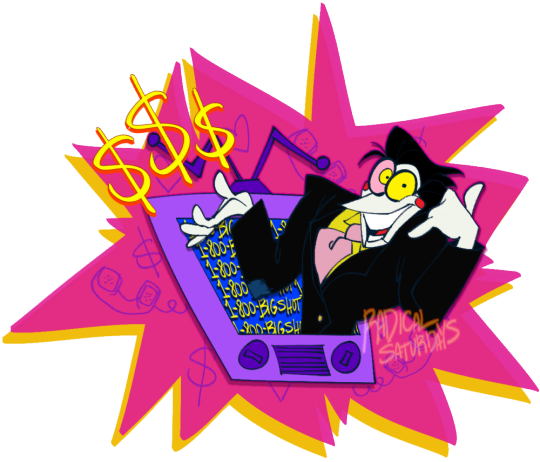
YOUR’S FOR JUST THREE EASY PAYMENTS OF !! [[GUARANTEED!]]
#spamton#spamton deltarune#deltarune#deltarune fanart#utdr#toby fox#i was plagued with a vision and had to make it real#i ended up having a lot of fun with this im very pleased with how it came out#trying to do more backgrounds....#its also transparent!!#also wanted to add i was v much inspired by rockos modern lifes aesthetic and like#that trope in 90s commercials where things would pop out of/get sucked into the tv yknow#fresh art tag
656 notes
·
View notes
Text
honestly i think a very annoying part about the AI art boom is that techbros are out here going BEHOLD, IT CAN DO A REASONABLE FACSIMILE OF GIRL WITH BIG BOOBA, THE PINNACLE OF ARTISTIC ACHIEVEMENT and its like
no it’s fucking not! That AI wants to do melty nightmare fractal vomit so fucking bad and you are shackling it to a post and force-feeding it the labor of hard-working artists when you could literally pay someone to draw you artisanal hand-crafted girls with big boobs to your exact specifications and let your weird algorithms make art that can be reasonably used to represent horrors beyond human comprehension
#like AI art generation is inherently unethical because nobody will be transparent about sources#and AI art cannot exist without human input both at a concept level (because it needs art to train on) and at an output level#but like also COME ON#THIS IS ALL YOU CAN COME UP WITH??#WEIRD LANDSCAPES AND GIRLS WITH TITS?#to clarify bc jesus christ this post took off: AI art gen as it is now is inherently unethical as long as it relies#on scraping unedited human art into its mouth and using it for training#there are ethical ways to do it and it is essentially just a tool#people are just greedy and dumb
20K notes
·
View notes
Text
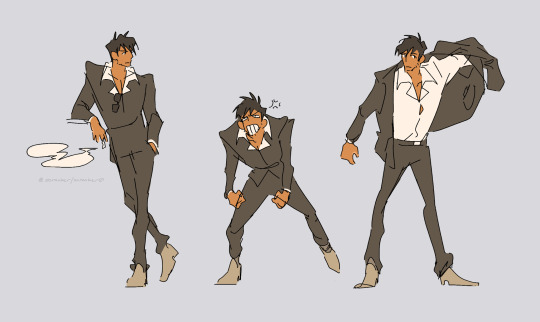

have been super busy lately so doodled some wolfies to destress ^_^
#trigun#wolfwood#trigun maximum#oops i almost forgot to post this here#i wanted to try some ww gestures in between workin on stuff hehe#i hadnt drawn him for like OVER A WEEK before this IT WAS RLY AFFECTING ME 💀💀💀💀#also wanted to try to emulate nightows CRAZY AWESOME ANATOMY DEFYING poses with the punisher#but then i realized I HID THE ENTIRE POSE BEHIND IT 💀💀💀 LIKE DO U EVER JUST 🤣🤣🤣🤣🤣#so i just cheated n made it transparent LOLLOLLLLLLLL#I RLY HATE DRAWING THE PUNISHER BC ITS SO HARD FOR ME BUT ITS SOOOO SWAGGY 💀#man even tho tumblr isnt my main platform anymore i love posting on here bc i can just though vomit in the tags#cant rly do that on twt or ig#its like u guys on here get a little peek into my Twisted Mind 🫶 a littol behind the scenes treat… sorta not rly LMAO#or maybe it just makes me sound crazy idk
3K notes
·
View notes
Text
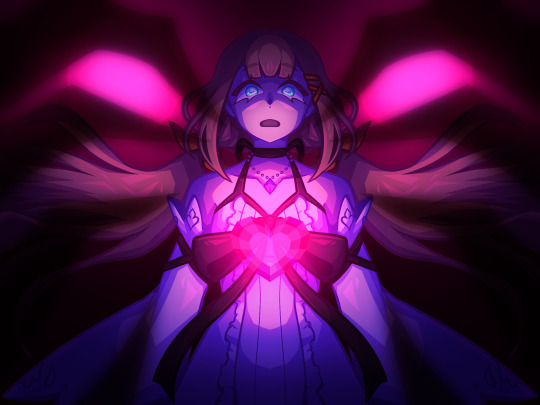
Redraw of a VERY old Strelitzia piece. Crazy what... four whole years...... of drawing can do.
+ the old one(s)
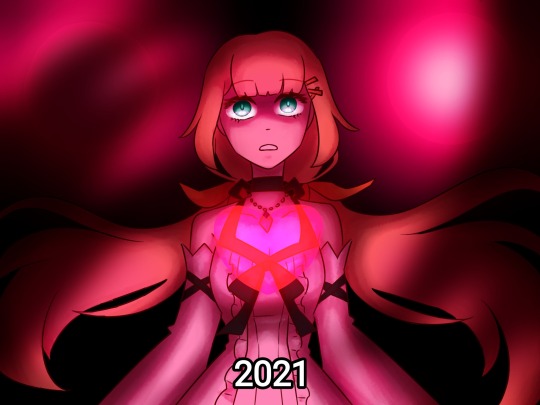

#it almost looks like its drawn by a completely different person omg#also i just noticed that her heart got progressively more solid with each version lol#the og 2020 one is just a blurred put heart light#and the 2021 one is more defined but very transparent#whereas the most recent one has a just slightly see-through crystal heart#lolol#four years of development is crazy#strelitzia#kingdom hearts#kingdom hearts union x#kh#khux#i think i drew this sometime after the first time i actually watched the khux cutscenes?#art#my art#xanders art#digital art#fan art
214 notes
·
View notes
Text
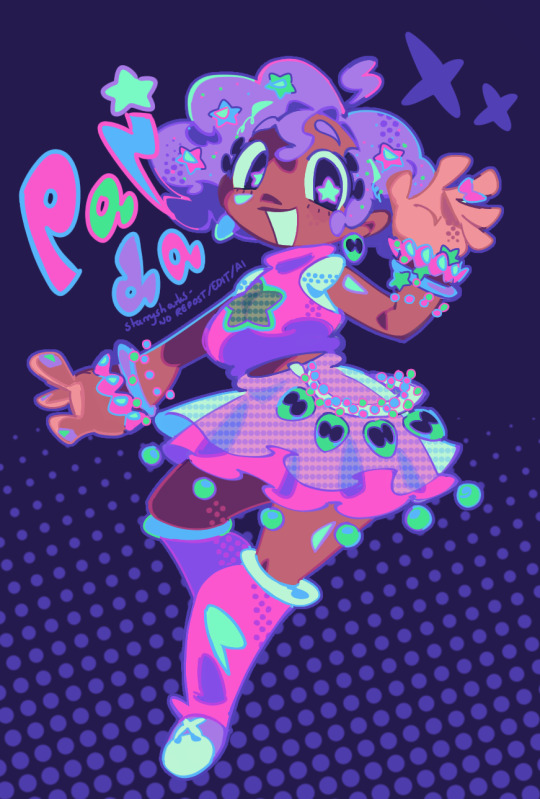
space city idol 👽
#kaigai idols#idols#paida#uchuu kei#you guys should listen to her music pls its literally the cutest shit ever#stream future☆☆town bitches!!!!!!#also i tried to experiment heavily with halftones here and it was SO FUN. most was done by hand (exceptions being transparent effects + bg)#overall i'm really proud of this piece :D#zeno's art#bright colors#eyestrain
614 notes
·
View notes
Text

#worm#wormposting#made this because the bar in hand jumper is called The Underside#made this in ms paint so i now have every layer saved as its own picture. couldn't be assed to port it to photoshop#also made an ant mask version and kept transparent background versions in case of anything#did i fuck up the hair? i tried to make it curly enough but i wasn't sure#i based it off of my own hair which isn't curly
342 notes
·
View notes
Text

gale for my troubles

#gale dekarios#gale of waterdeep#bg3#baldur's gate 3#my art#never question the clothing i choose to draw its always random#also i had to do the transparent bar trick cause this wouldnt show up in the main tags when i posted it smh
202 notes
·
View notes
Text
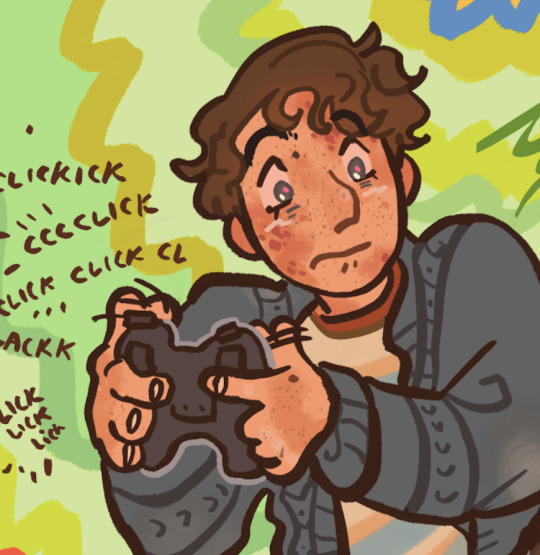
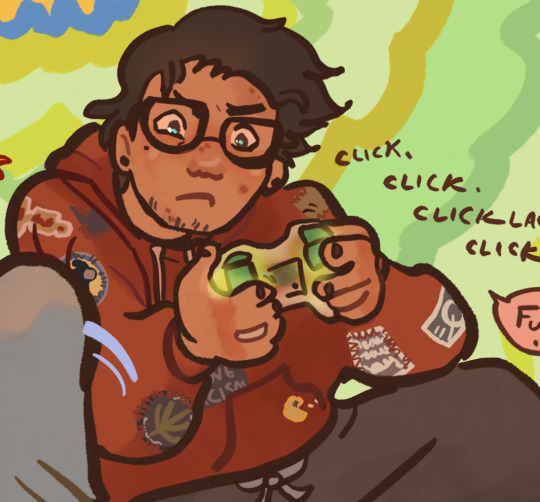
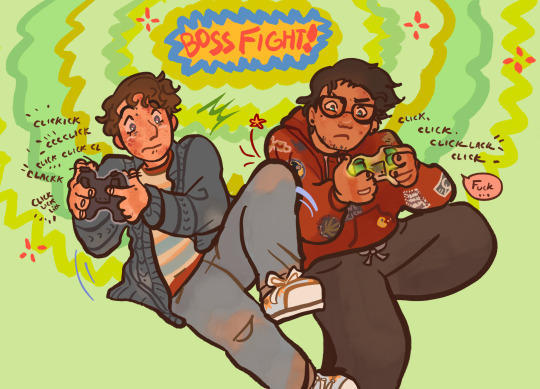
BOSS FIGHT!
#bmc#be more chill#jeremy heere#michael mell#jeremy bmc#michael bmc#boyf riends#hi hello this is actually propaganda for my headcanons so study up guys. consider yourself conscripted#jeremy with severe acne and an unfortunately placed mole#who wears the same sweater literally every day and its starting to wear white and get holes#(btw wovenvessel if youre seeing this yes i stole your sweater drawing technique im sorry dflksdjlfksf)#michael who has embarrassing patchy teen facial hair and also sews all his patches on really shittily with a machine#michael has one of those epic transparent controllers and they have fought over it so much#that they have slowly developed an incredibly convoluted system to determine who gets it each time#also slow stoner michael and anxious stoner jeremy#he has a bad time like half the time but he does it anyway#my art#my posts#art#posts#jeremy#michael#bmc michael#wuuujer#bmc jeremy#oh also gave jeremy my irl sunflower converse bc i do what i want#(actually so my cosplay feels more accurate shhhhh)
201 notes
·
View notes
Text

awww look!!!! you're his favorite!! <3<3
#fnaf sb#fnaf sb moon#fnaf moondrop#fnaf dca#lovesick#lovestruck#afton virus au#afton'd reader au#fnaf au#fnaf moon x reader#fnaf moon x y/n#doodles#sketches#magma doodle#eye contact#tw eye contact#transparent png#lineless art#its been a while since i rlly tried lineless art so uh. yeah this looks rough#also wasnt able to sketch it out before actually starting so it looks wonky im so sorry sdjkfshdf#bones of a rabbit#bones of a rabbit au#afton au moon
289 notes
·
View notes
Text

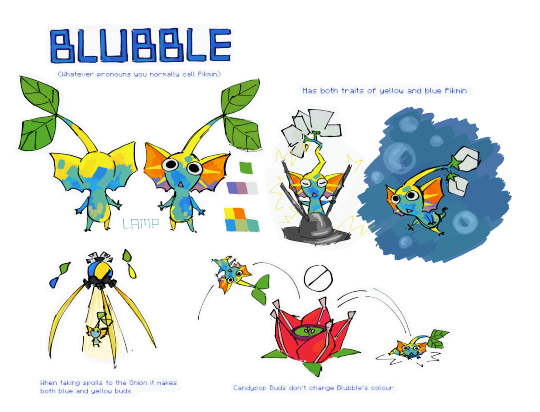
@cephalonheadquarters well ermmm i do now!!
#why does the text look so shit when not zoomed in#also if anyones wondering why i have semi transparent around my refs its so when people copy paste you can still see the lines and#for the ppl who prefer to download refs they dont have it cover a ton of space with the bg#pikmin#my art#ocs#oc:blubble
226 notes
·
View notes
Text
Hi I made more (3rd one) since u guys are goin crazy over the other two ^_^ glad y'all like 'em!!!!
Minor spoilers? But not really? Like if u haven't read it's not gonna really give much away


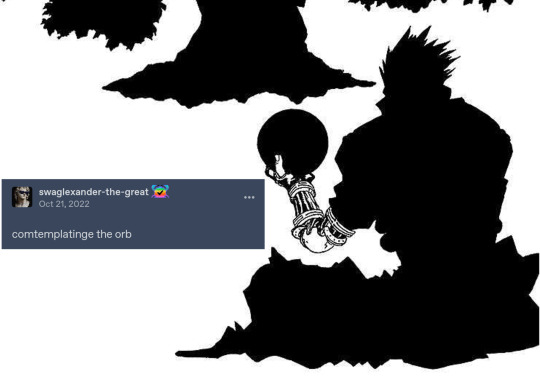

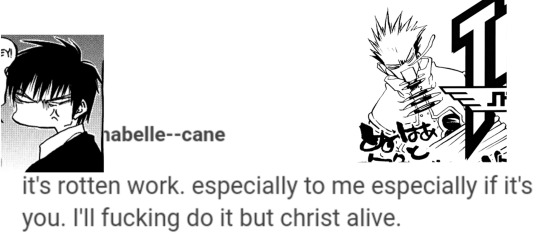



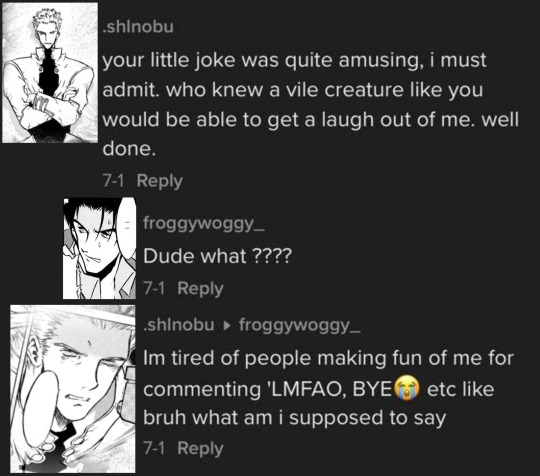

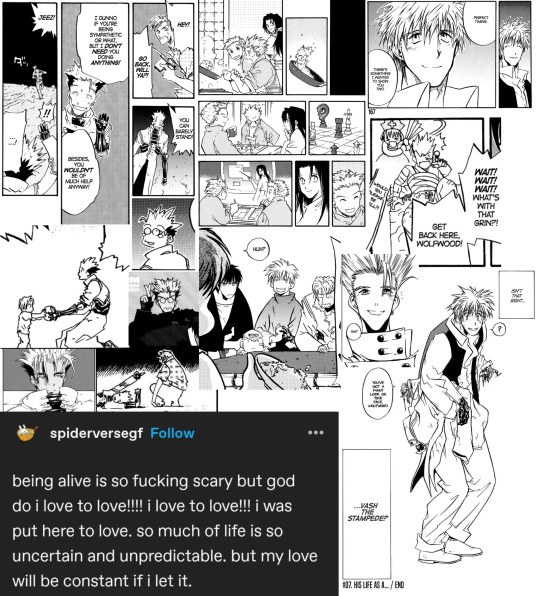
More: 1 | 2
#these feel more disjointed than the other two but i was messing w the layout for like 10 straight minutes#before giving up so sorry if the flow feels weird#also donot look at me 4 how much effort i put into making that one zazie panel transparent . its a good panel ok#trigun text posts#trimax#trigun maximum#trimax text posts#??#my edit#um should i tag this as#millionsummers#? for the first image#and also#vashwood#anyway last image is my fav i love vash sm. im shaking him around aggressively
81 notes
·
View notes
Note
Hey! It has been on my mind lately and i just wanna ask..idk if it would make sense but i just noticed that nowadays ppl cant separate the authors and their books (ex. when author wrote a story about cheating and ppl starts bashing the author for romanticizing cheating and even to a point of cancelling the author for not setting a good/healthy example of a relationship) any thoughts about it?
I have many, many thoughts on this, so this may get a little unwieldy but I'll try to corall it together as best I can.
But honestly, I think sometimes being unable to separate the author from the work (which is interesting to me to see because some people are definitely not "separating" anything even though they think they are; they just erase the author entirely as an active agent, isolate the work, and call it "objectivity") has a lot to do with some people being unable to separate the things they read from themselves.
I'm absolutely not saying it's right, but it's an impulse I do understand. If you read a book and love it, if it transforms your life, or defines a particular period of your life, and then you find out that the author has said or done something awful--where does that leave you? Someone awful made something beautiful, something you loved: and now that this point of communion exists between you and someone whose views you'd never agree with, what does that mean for who you are? That this came from the mind of a person capable of something awful and spoke to your mind--does that mean you're like them? Could be like them?
Those are very uncomfortable questions and I think if you have a tendency to look at art or literature this way, you will inevitable fall into the mindset where only "Good" stories can be accepted because there's no distinction between where the story ends and you begin. As I said, I can see where it comes from but I also find it profoundly troubling because i think one of the worst things you can do to literature is approach it with the expectation of moral validation--this idea that everything you consume, everything you like and engage with is some fundamental insight into your very character as opposed to just a means of looking at or questioning something for its own sake is not just narrow-minded but dangerous.
Art isn't obliged to be anything--not moral, not even beautiful. And while I expend very little (and I mean very little) energy engaging with or even looking at internet / twitter discourse for obvious reasons, I do find it interesting that people (online anyway) will make the entire axis of their critique on something hinge on the fact that its bad representation or justifying / romanticizing something less than ideal, proceeding to treat art as some sort of conduit for moral guidance when it absolutely isn't. And they will also hold that this critique comes from a necessarily good and just place (positive representation, and I don't know, maybe in their minds it does) while at the same time setting themselves apart from radical conservatives who do the exact same thing, only they're doing it from the other side.
To make it abundantly clear, I'm absolutely not saying you should tolerate bigots decrying that books about the Holocaust, race, homophobia, or lgbt experiences should be banned--what I am saying, is that people who protest that a book like Maus or Persepolis is going to "corrupt children", and people who think a book exploring the emotional landscape of a deeply flawed character, who just happens to be from a traditionally marginalised group or is written by someone who is, is bad representation and therefore damaging to that community as a whole are arguments that stem from the exact same place: it's a fundamental inability, or outright refusal, to accept the interiority and alterity of other people, and the inherent validity of the experiences that follow. It's the same maniacal, consumptive, belief that there can be one view and one view only: the correct view, which is your view--your thoughts, your feelings.
There is also dangerous element of control in this. Someone with racist views does not want their child to hear anti-racist views because as far as they are concerned, this child is not a being with agency, but a direct extension of them and their legacy. That this child may disagree is a profound rupture and a threat to the cohesion of this person's entire worldview. Nothing exists in and of and for itself here: rather the multiplicity of the world and people's experiences within it are reduced to shadowy agents that are either for us or against us. It's not about protecting children's "innocence" ("think of the children", in these contexts, often just means "think of the status quo"), as much as it is about protecting yourself and the threat to your perceived place in the world.
And in all honestt I think the same holds true for the other side--if you cannot trust yourself to engage with works of art that come from a different standpoint to yours, or whose subject matter you dislike, without believing the mere fact of these works' existence will threaten something within you or society in general (which is hysterical because believe me, society is NOT that flimsy), then that is not an issue with the work itself--it's a personal issue and you need to ask yourself if it would actually be so unthinkable if your belief about something isn't as solid as you think it is, and, crucially, why you have such little faith in your own critical capacity that the only response these works ilicit from you is that no one should be able to engage with them. That's not awareness to me--it's veering very close to sticking your head in the sand, while insisting you actually aren't.
Arbitrarily adding a moral element to something that does not exist as an agent of moral rectitude but rather as an exploration of deeply human impulses, and doing so simply to justify your stance or your discomfort is not only a profoundly inadequate, but also a deeply insidious, way of papering over your insecurities and your own ignorance (i mean this in the literal sense of the word), of creating a false and dishonest certainty where certainty does not exist and then presenting this as a fact that cannot and should not be challenged and those who do are somehow perverse or should have their characters called into question for it. It's reductive and infantilising in so many ways and it also actively absolves you of any responsibility as a reader--it absolves you of taking responsibility for your own interpretation of the work in question, it absolves you of responsibility for your own feelings (and, potentially, your own biases or preconceptions), it absolves you of actual, proper, thought and engagement by laying the blame entirely on a rogue piece of literature (as if prose is something sentient) instead of acknowledging that any instance of reading is a two-way street: instead of asking why do I feel this way? what has this text rubbed up against? the assumption is that the book has imposed these feelings on you, rather than potentially illuminated what was already there.
Which brings me to something else which is that it is also, and I think this is equally dangerous, lending books and stories a mythical, almost supernatural, power that they absolutely do not have. Is story-telling one of the most human, most enduring, most important and life-altering traditions we have? Yes. But a story is also just a story. And to convince yourself that books have a dangerous transformative power above and beyond what they are actually capable of is, again, to completely erase people's agency as readers, writers' agency as writers and makers (the same as any other craft), and subsequently your own. And erasing agency is the very point of censors banning books en masse. It's not an act of stupidity or blind ignorance, but a conscious awareness of the fact that people will disagree with you, and for whatever reason you've decided that you are not going to let them.
Writers and poets are not separate entities to the rest of us: they aren't shamans or prophets, gifted and chosen beings who have some inner, profound, knowledge the rest of us aren't privy to (and should therefore know better or be better in some regard) because moral absolutism just does not exist. Every writer, no matter how affecting their work may be, is still Just Some Guy Who Made a Thing. Writing can be an incredibly intimate act, but it can also just be writing, in the same way that plumbing is plumbing and weeding is just weeding and not necessarily some transcendant cosmic endeavour in and of itself. Authors are no different, when you get down to it, from bakers or electricians; Nobel laureates are just as capable of coming out with distasteful comments about women as your annoying cousin is and the fact that they wrote a genre-defying work does not change that, or vice-versa. We imbue books with so much power and as conduits of the very best and most human traits we can imagine and hope for, but they aren't representations of the best of humanity--they're simply expressions of humanity, which includes the things we don't like.
There are some authors I love who have said and done things I completely disagree with or whose views I find abhorrent--but I'm not expecting that, just because they created something that changed my world, they are above and beyond the ordinarly, the petty, the spiteful, or cruel. That's not condoning what they have said and done in the least: but I trust myself to be able to read these works with awareness and attention, to pick out and examine and attempt to understand the things that I find questionable, to hold on to what has moved me, and to disregard what I just don't vibe with or disagree with. There are writers I've chosen not to engage with, for my own personal reasons: but I'm not going to enforce this onto someone else because I can see what others would love in them, even if what I love is not strong enough to make up for what I can't. Terrance Hayes put perfectly in my view, when he talks about this and being capable of "love without forgiveness". Writing is a profoundly human heritage and those who engage with it aren't separate from that heritage as human because they live in, and are made by, the exact same world as anyone else.
The measure of good writing for me has hardly anything to do with whatever "virtue" it's perceived to have and everything to do with sincerity. As far as I'm concerned, "positive representation" is not about 100% likeable characters who never do anything problematic or who are easily understood. Positive representation is about being afforded the full scope of human feelings, the good, the bad, and the ugly, and not having your humanity, your dignity, your right to exist in the world questioned because all of these can only be seen through the filter of race, or gender, religion, or ethicity and interpreted according to our (profoundly warped) perceptions of those categories and what they should or shouldn't represent. True recognition of someone's humanity does not lie in finding only what is held in common between you (and is therefore "acceptable", with whatever you put into that category), but in accepting everything that is radically different about them and not letting this colour the consideration you give.
Also, and it may sound harsh, but I think people forget that fictional characters are fictional. If I find a particularly fucked up relationship dynamic compelling (as I often do), or if I decide to write and explore that dynamic, that's not me saying two people who threaten to kill each other and constantly hurt each other is my ideal of romance and that this is exactly how I want to be treated: it's me trying to find out what is really happening below the surface when two people behave like this. It's me exploring something that would be traumatizing and deeply damaging in real life, in a safe and fictional setting so I can gain some kind of understanding about our darker and more destructive impulses without being literally destroyed by them, as would happen if all of this were real. But it isn't real. And this isn't a radical or complex thing to comprehend, but it becomes incomprehensible if your sole understanding of literature is that it exists to validate you or entertain you or cater to you, and if all of your interpretations of other people's intentions are laced with a persistent sense of bad faith. Just because you have not forged any identity outside of this fictional narrative doesn't mean it's the same for others.
Ursula K. le Guin made an extremely salient point about children and stories in that children know the stories you tell them--dragons, witches, ghouls, whatever--are not real, but they are true. And that sums it all up. There's a reason children learning to lie is an incredibly important developmental milestone, because it shows that they have achieved an incredibly complex, but vitally important, ability to hold two contradictory statements in their minds and still know which is true and which isn't. If you cannot delve into a work, on the terms it sets, as a fictional piece of literature, recognize its good points and note its bad points, assess what can have a real world impact or reflects a real world impact and what is just creative license, how do you possible expect to recognize when authority and propaganda lies to you? Because one thing propaganda has always utilised is a simplistic, black and white depiction of The Good (Us) and The Bad (Them). This moralistic stance regarding fiction does not make you more progressive or considerate; it simply makes it easier to manipulate your ideas and your feelings about those ideas because your assessments are entirely emotional and surface level and are fuelled by a refusal to engage with something beyond the knee-jerk reaction it causes you to have.
Books are profoundly, and I do mean profoundly, important to me-- and so much of who I am and the way I see things is probably down to the fact that stories have preoccupied me wherever I go. But I also don't see them as vital building blocks for some core facet or a pronouncement of Who I Am. They're not badges of honour or a cover letter I put out into the world for other people to judge and assess me by, and approve of me (and by extension, the things I say or feel). They're vehicles through which I explore and experience whatever it is that I'm most caught by: not a prophylactic, not a mode of virtue signalling, and certainly not a means of signalling a moral stance.
I think at the end of the day so much of this tendency to view books as an extension of yourself (and therefore of an author) is down to the whole notion of "art as a mirror", and I always come back to Fran Lebowitz saying that it "isn't a mirror, it's a door". And while I do think it's important to have that mirror (especially if you're part of a community that never sees itself represented, or represented poorly and offensively) I think some people have moved into the mindset of thinking that, in order for art to be good, it needs to be a mirror, it needs to cater to them and their experiences precisely--either that or that it can only exist as a mirror full stop, a reflection of and for the reader and the writer (which is just incredibly reductive and dismissive of both)--and if art can only exist as a mirror then anything negative that is reflected back at you must be a condemnation, not a call for exploration or an attempt at understanding.
As I said, a mirror is important but to insist on it above all else isn't always a positive thing: there are books I related to deeply because they allowed me to feel so seen (some by authors who looked nothing like me), but I have no interest in surrounding myself with those books all the time either--I know what goes on in my head which is precisely why I don't always want to live there. Being validated by a character who's "just like me" is amazing but I also want--I also need-- to know that lives and minds and events exist outside of the echo-chamber of my own mind. The mirror is comforting, yes, but if you spend too long with it, it also becomes isolating: you need doors because they lead you to ideas and views and characters you could never come up with on your own. A world made up of various Mes reflected back to me is not a world I want to be immersed in because it's a world with very little texture or discovery or room for growth and change. Your sense of self and your sense of other people cannot grow here; it just becomes mangled.
Art has always been about dialogue, always about a me and a you, a speaker and a listener, even when it is happening in the most internal of spaces: to insist that art only ever tells you what you want to hear, that it should only reflect what you know and accept is to undermine the very core of what it seeks to do in the first place, which is establish connection. Art is a lifeline, I'm not saying it isn't. But it's also not an instruction manual for how to behave in the world--it's an exploration of what being in the world looks like at all, and this is different for everyone. And you are treading into some very, very dangerous waters the moment you insist it must be otherwise.
Whatever it means to be in the world, it is anything but straightforward. In this world people cheat, people kill, they manipulate, they lie, they torture and steal--why? Sometimes we know why, but more often we don't--but we take all these questions and write (or read) our way through them hoping that, if we don't find an answer, we can at least find our way to a place where not knowing isn't as unbearable anymore (and sometimes it's not even about that; it's just about telling a story and wanting to make people laugh). It's an endless heritage of seeking with countless variations on the same statements which say over and over again I don't know what to make of this story, even as I tell it to you. So why am I telling it? Do I want to change it? Can I change it? Yes. No. Maybe. I have no certainty in any of this except that I can say it. All I can do is say it.
Writing, and art in general, are one of the very, very, few ways we can try and make sense of the apparently arbitrary chaos and absurdity of our lives--it's one of the only ways left to us by which we can impose some sense of structure or meaning, even if those things exists in the midst of forces that will constantly overwhelm those structures, and us. I write a poem to try and make sense of something (grief, love, a question about octopuses) or to just set down that I've experienced something (grief, love, an answer about octpuses). You write a poem to make sense of, resolve, register, or celebrate something else. They don't have to align. They don't have to agree. We don't even need to like each other much. But in both of these instances something is being said, some fragment of the world as its been perceived or experienced is being shared. They're separate truths that can exist at the same time. Acknowledging this is the only means we have of momentarily bridging the gaps that will always exist between ourselves and others, and it requires a profound amount of grace, consideration and forbearance. Otherwise, why are we bothering at all?
#this is so much longer than i intended but yeah. those are my very long 2 cents#tbh i also think social media makes it worse in a way especially bc “transparency” has become a form of public vetting which is insane to m#me* transparency and honesty are not the same thing ans its ludicrous that this is where we're at and while we all have to live with this#demand for transparency i do think it affects writers differently bc the whole art as mirror thing comes to the fore in this argument#why would you sit with your feelings about a book when its easier and more accessible for you to @ the authors twitter handle#but anyway#ask#anonymous#book talks
399 notes
·
View notes
Text
Oh shit now I've GOTTA buy that pass-
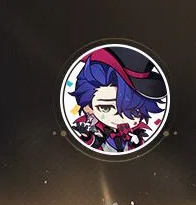
I need him. I need him NOW
I TOLD myself I'd only really commit to buying the full pass if he was an icon-
Here I am
My day has come
#Sorry not sorry followers#I Simpo for Sampo™#Also you better believe I'll find a transparent of that and edit it into my actual icon once its out#so down bad for him in a lovingly yet asexual kinda way#he's my silly little guy#hsr#hsr sampo#sampo koski
77 notes
·
View notes
Text



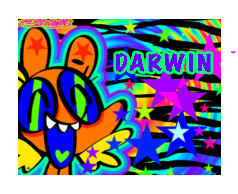

THE BROS + MY FIRST ATTEMPT AT MAKING STAMPS!!
ur free to use them anywhere with credit :3
#currently posting this at school rn during break#im outside cuz i get the best signal out here#but its like 30 degrees out#i feel like my hands are gonna fall off#womp womp#ALSO i tried to bling the stamps but every glitter website hates me for some reason 😭#transparency issues <\3#eyestrain#eyestrain tw#rainbowcore#digital art#ibispaintx#fanart#rainbow artist#silly art#rainbow art#neon art#neon artist#stamps#tawog#the amazing world of gumball#tawog fanart#tawog gumball#gumball tawog#gumball watterson#darwin tawog#tawog darwin#darwin watterson
88 notes
·
View notes
Text
i think the appeal of juri to me is that women do not often get to have the comically edgy, so-far-gone it loops around to being kinda cool again visual designs, like she has a dyed hair streak and a spider tattoo and heterochromia and one eye glows bright purple its really a lot.
but also shes just a really depressed angry person who lashes out at anyone around her, especially people who try to get closer to her. which is kind of an interesting place to take a design like that. its more understated than just “i look evil and i am”
i have a big soft spot for characters who try to compensate for the lack of control and/or security they feel in their lives with anger/violence and thrillseeking. i know i’m talking about fucking street fighter here but i really am just still thinking about how at the end of your master missions with juri, after she’s kind of opened up to you and spoken frankly to you a number of times with a lot less of an emotional wall up, she abruptly pushes you away and tells you to not bother her again. idk.
there’s nothing after that. that’s just the end. you finally take two rounds off her in a fight and she just tells you “I just thought if I could get some meathead to copy my moves… maybe, just maybe, that’d be fun. But I’ve had enough. I’m sick of it.” there’s no resolution here. in her arcade mode there’s also no resolution, even though she acknowledges the fact that she feels awful — she has no idea how to fix it. she resents chun-li for her ability to heal and grow and for encouraging juri to do the same.
idk.
she lies to you about how influential and powerful she is, lies to you about her friendly relations with others, tells you the truth about her family and childhood trauma then tries to pass it off as a lie, candidly expresses her dissatisfaction with life to you. and then that’s that. it’s over.
obviously, speaking in terms of real-world motivation, her visuals were made with horny/rule of cool first and tying in with that characterization second, but in the context of that characterization it feels more like a deliberate attempt to project volatility and unapproachability. it’s kinda interesting to think about.
i will not speak on the feet thing
#street fighter#street fighter 6#juri han#text#noomposting#in previous games juri just being lonely and traumatized was hinted towards in some few lines of text but#its Really Obvious in sf6#being completely transparent i am also simply a useless homosexual who likes the scary violence woman#but i was surprised by how endearing i found her#shes just treading water mam
182 notes
·
View notes
Note
Loveing all this drow art! You feed my soul!
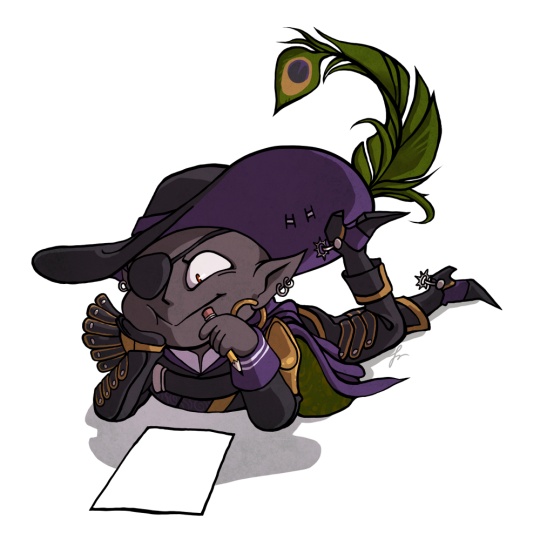
✨write me back! love, jarlaxle✨
#ugh i guess i need a drawing tag#i won't be answering asks usually but it was pretty good timing#inspired by that one poe fanmail comic by kate beaton everyone riffs on#also its transparent so you can stick whatever on his letter easily#jarlaxle
72 notes
·
View notes